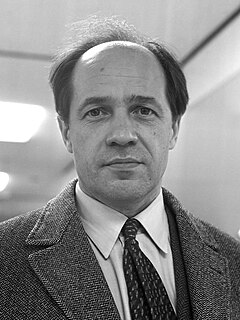
Pierre Louis Joseph Boulez CBE was a French composer, conductor, writer and founder of several musical institutions. He was one of the dominant figures of the post-war classical music world.

IRCAM is a French institute dedicated to the research of music and sound, especially in the fields of avant garde and electro-acoustical art music. It is situated next to, and is organisationally linked with, the Centre Pompidou in Paris. The extension of the building was designed by Renzo Piano and Richard Rogers. Much of the institute is located underground, beneath the fountain to the east of the buildings.
Sir George William John Benjamin, CBE is an English composer of classical music. He is also a conductor, pianist and teacher.

Pierre-Laurent Aimard is a French pianist.
Unsuk Chin is a South Korean composer of classical music, who is based in Berlin, Germany. Chin began her journey with music at a fairly young age, as she taught herself how to play the piano and music theory. She was awarded the Grawemeyer Award in 2004, the Arnold Schönberg Prize in 2005, the Music Composition Prize of the Prince Pierre Foundation in 2010, the Ho-Am Prize in the Arts in 2012, the Wihuri Sibelius Prize in 2017, the Marie-Josée Kravis Prize for New Music of the New York Philharmonic in 2018, the Bach Prize in 2019, as well as the Léonie Sonning Music Prize in 2021.

Michael Kevin Daugherty is an American composer, pianist, and teacher. He is influenced by popular culture, Romanticism, and Postmodernism. Daugherty's notable works include his Superman comic book-inspired Metropolis Symphony for Orchestra (1988–93), Dead Elvis for Solo Bassoon and Chamber Ensemble (1993), Jackie O (1997), Niagara Falls for Symphonic Band (1997), UFO for Solo Percussion and Orchestra (1999) and for Symphonic Band (2000), Bells for Stokowski from Philadelphia Stories for Orchestra (2001) and for Symphonic Band (2002), Fire and Blood for Solo Violin and Orchestra (2003) inspired by Diego Rivera and Frida Kahlo, Time Machine for Three Conductors and Orchestra (2003), Ghost Ranch for Orchestra (2005), Deus ex Machina for Piano and Orchestra (2007), Labyrinth of Love for Soprano and Chamber Winds (2012), American Gothic for Orchestra (2013), and Tales of Hemingway for Cello and Orchestra (2015). Daugherty has been described by The Times (London) as "a master icon maker" with a "maverick imagination, fearless structural sense and meticulous ear."
Matthias Pintscher is a German composer and conductor. As a youth, he studied the violin and conducting.

Péter Eötvös is a Hungarian composer, conductor and teacher.
The Orchestre Philharmonique de Radio France is a French radio orchestra, affiliated with Radio France. The orchestra performs principally at the auditorium of the Maison de la Radio in Paris, along with several concerts at the Philharmonie de Paris.

Susanna Ulla Marjukka Mälkki is a Finnish conductor and cellist. She is the daughter of Pirkko Liisa Vainio and the marine scientist Pentti Mälkki.

Claude Ledoux is a Belgian composer, born in 1960.
Christophe Bertrand was a French composer of contemporary classical music.
KAIROS is an Austrian record label, which specializes in contemporary music. Its recordings have received multiple awards including the Diapason d'Or. It was founded by Barbara Fränzen and Peter Oswald in 1999 and, in 2015, became part of paladino media, a company owned by the Austrian cellist Martin Rummel. The main cover artists are Jakob Gasteiger, Erwin Bohatsch and Enrique Fuentes.
Márta Fábián is an award-winning Hungarian cimbalom player and soloist.
Jaehyuck Choi is a South Korean composer and conductor of classical music, based in New York and Seoul.
The Lucerne Festival Academy is an orchestra-sized educational institution devoted exclusively to the interpretation and performance of contemporary classical music. It has taken place each summer since 2003 in the Swiss city of Lucerne as part of the Lucerne Festival in Summer. Founded by the French composer Pierre Boulez and festival director Michael Haefliger, over 1100 young musicians from over 60 countries have taken part in the Academy, described by The Guardian as "the annual laboratory in which brilliant young musicians are immersed in the performance practice of 20th- and 21st-century music".
Pierre Thibaud was a French classical trumpeter.
Clément Saunier is a French classical trumpeter.
Pascal Gallois is a French bassoonist, conductor and music teacher, specialising in contemporary classical music.

Amir Shpilman is an Israeli composer.









